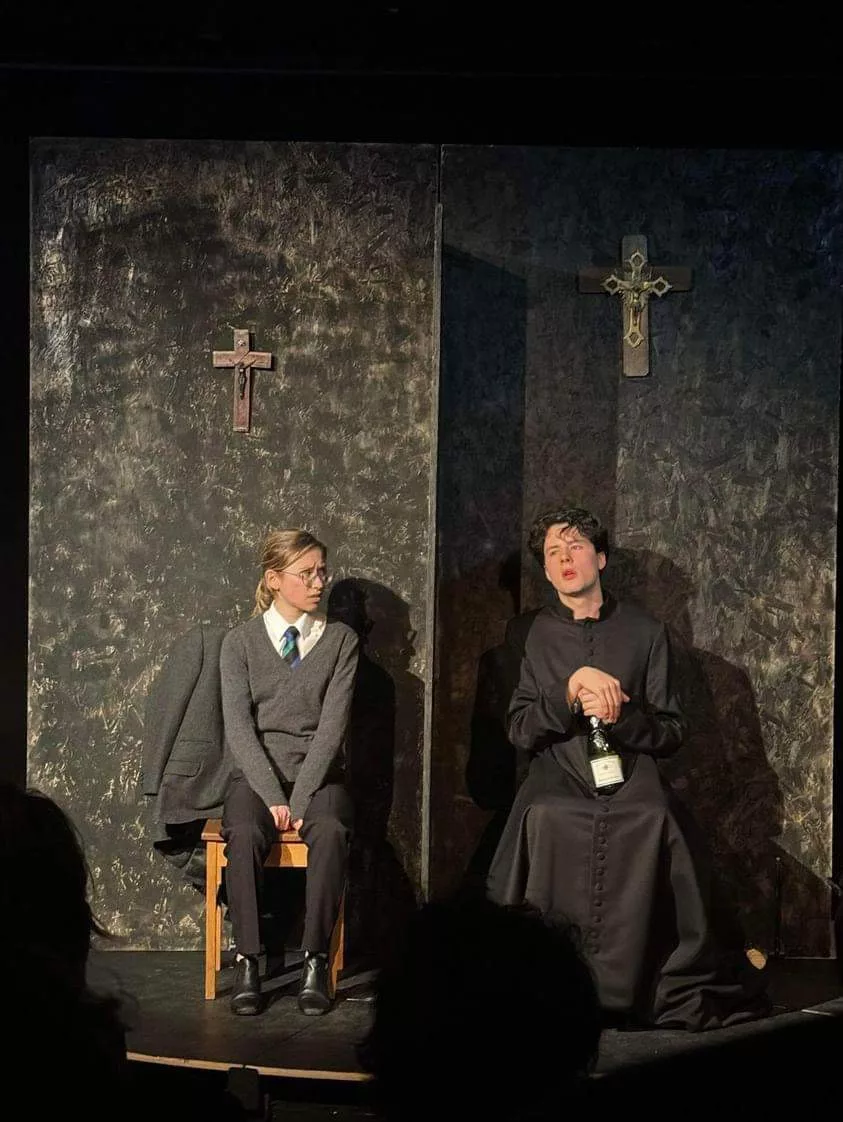Expectations were high for Daddy Longlegs. The cast was apparently impressive – the lead role being played by a supposedly ‘born actor’. A lot of money had been put into it, from a lot of sources – and a lot of time as well. Production had been going on since the Christmas holiday. Costumes and set all sourced from the National Theatre. In short, I’d been promised quite the spectacle – and I got it.
Daddy Longlegs went above and beyond the standard I’ve come to expect of student productions in my time at Oxford. It was clear I was in for something brilliant from the start, with the remarkable set, standing apart from anything I’ve seen in Oxford before. The centrepiece was a magnificent rotating platform. On one side was a confessional box, decorated with crucifixes and sombre dark paint. On the other, its inverted mirror image, two toilet cubicles separated by a glory hole, on a backdrop of bright, lewd graffiti. It was a masterwork, brilliantly representing the two aspects of the Priest’s personality – and it was hilariously funny as well. The whole thing must have taken a mountain of time and effort to put together, but it worked perfectly.
I’d also been promised good acting – or rather, great acting. But it was even better than I could have expected. Will Shackleton, as the Priest, dominated the stage throughout the production, with a Barry Keoghan-esque performance which started off as the slightly pitiful socially anxious outsider but grew increasingly more unsettling as the play went on. His expert capturing of the mental instability of his character was transfixing to watch, but, perhaps more importantly, it was also comical throughout. This was an actor who could fully embody all the different aspects of his complex character, and do them well. A ‘born actor’ indeed, and one I hope to see more of in productions to come.
Daddy Longlegs is a bit of a one-man show, but the supporting cast were all spot-on in their own performances. Susie Weidmann, Lucas Ipkendanz and Juliette Imbert all delivered expertly as the struggling family who each come to see the Priest in turn in the confession box. Imbert was particularly impressive in her convincing portrayal of a fourteen-year-old schoolboy. George Vyvyan gave a touching and heartfelt performance as the love interest Jamie, and perhaps best of all was Vita Hamilton as the mother, who expertly toed the line between loving maternal figure and an underlying instability often as unsettling as her son’s. This was a production in which no performance disappointed.
Which brings me to a final question – did I enjoy it? The script was witty, and very sharp, but ultimately the whole story was inconsolably depressing. If this was the scriptwriter’s intention, they certainly succeeded. All the magic of brilliantly-done theatre can only go so far to offset a production which seemed fundamentally underlined by pessimistic nihilism, as far as enjoyment was concerned. I wasn’t quite sure what the play was trying to say, and it may have been that it wasn’t attempting to say anything at all. Fair enough, but it didn’t always make for the easiest watching. But all of this could be pinned down to personal taste. As student plays go, production, set, costumes, lighting, and acting – all were a level above the competition. For me, at least, Daddy Longlegs has set a new standard for student theatre in Oxford. Let’s hope to see more from where that came from.


